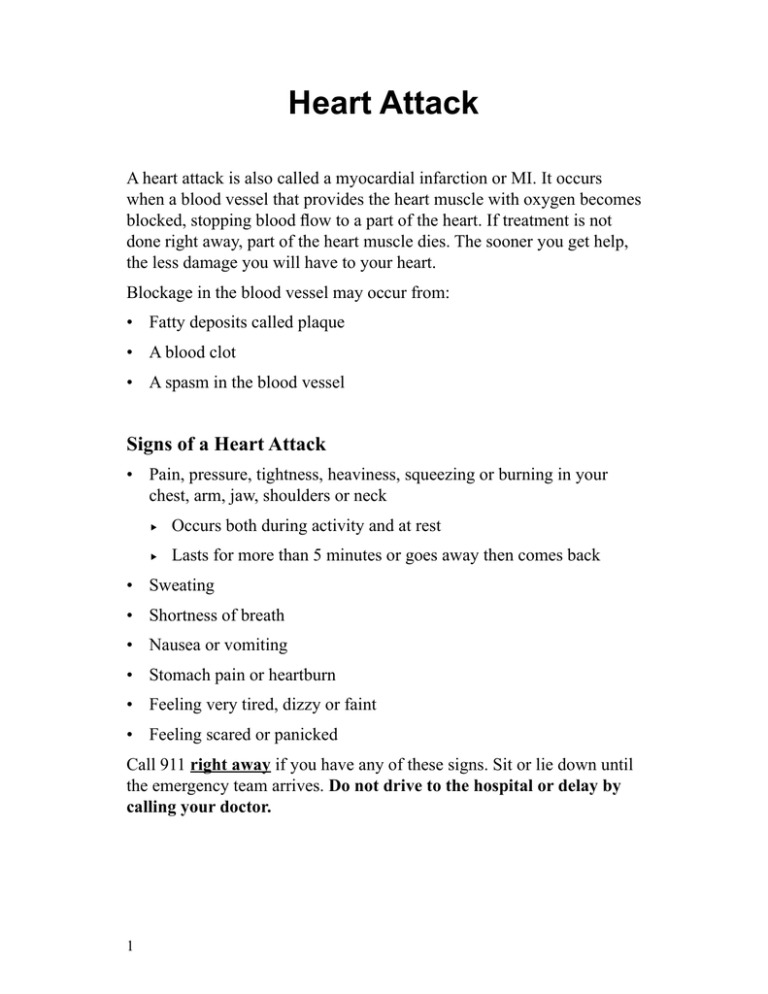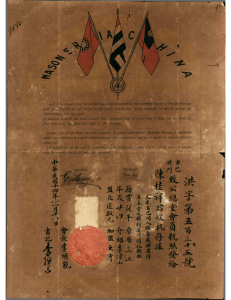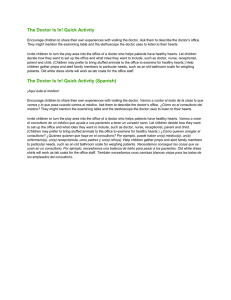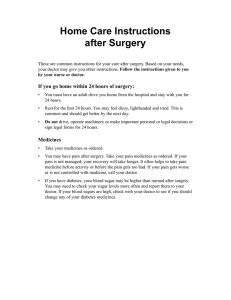Heart Attack - Health Information Translations
Anuncio

Heart Attack A heart attack is also called a myocardial infarction or MI. It occurs when a blood vessel that provides the heart muscle with oxygen becomes blocked, stopping blood flow to a part of the heart. If treatment is not done right away, part of the heart muscle dies. The sooner you get help, the less damage you will have to your heart. Blockage in the blood vessel may occur from: • Fatty deposits called plaque • A blood clot • A spasm in the blood vessel Signs of a Heart Attack • Pain, pressure, tightness, heaviness, squeezing or burning in your chest, arm, jaw, shoulders or neck ff Occurs both during activity and at rest ff Lasts for more than 5 minutes or goes away then comes back • Sweating • Shortness of breath • Nausea or vomiting • Stomach pain or heartburn • Feeling very tired, dizzy or faint • Feeling scared or panicked Call 911 right away if you have any of these signs. Sit or lie down until the emergency team arrives. Do not drive to the hospital or delay by calling your doctor. 1 Ataque cardíaco Un ataque cardíaco también se conoce como infarto de miocardio o MI por sus siglas en inglés. Sucede cuando se bloquea un vaso sanguíneo que proporciona oxígeno al músculo cardíaco y se detiene el flujo sanguíneo a parte del corazón. Si no es tratado de inmediato, parte del músculo cardíaco muere. Cuanto antes obtenga ayuda, menos daño sufrirá su corazón. El bloqueo de un vaso sanguíneo puede deberse a: • depósitos de grasa llamados placa; • un coágulo de sangre; • un espasmo en el vaso sanguíneo. Signos de un ataque cardíaco • Dolor, presión, rigidez, pesadez, tirantez o ardor en su pecho, brazo, mandíbula, hombros o cuello ff Puede darse tanto durante una actividad como descansando ff Dura más de 5 minutos, o se va y vuelve • Sudoración • Falta de aire • Náuseas o vómitos • Dolor de estómago o acidez • Sensación de cansancio, mareo o desmayo • Sensación de miedo o de pánico Llame al 911 inmediatamente si tiene alguno de estos signos. Siéntese o recuéstese hasta que llegue el equipo de emergencia. No conduzca al hospital ni se retrase llamando a su médico. Heart Attack. Spanish. 1 Some people, especially women, may not have chest pain, or they may have very mild signs. The more signs you have, the more likely you are having a heart attack. If you had a heart attack before, you may have different signs with a second heart attack. Do not ignore your signs. Call for help quickly to limit damage to your heart. Your Care at the Hospital Tests will be done to see if you had a heart attack and if there was damage to your heart. You may be in the hospital for a few days. You may be started on medicines and have treatments to improve the blood flow to your heart. Discharge Instructions after a Heart Attack • Go to your follow-up doctor’s appointment. • Ask about getting into a cardiac rehab program. • Limit your activity for 4 to 6 weeks. ff Rest each day. ff Increase your activity over time. ff ff Limit stair climbing. Take the stairs slowly. ff Avoid lifting more than 10 pounds or 4.5 kilograms. ff 2 Rest for 1 hour after eating meals and at least 30 minutes after activities such as bathing, showering or shaving. Do not vacuum, mow grass, rake or shovel. You may do light housework. Algunas personas, en especial las mujeres, pueden no sentir dolor en el pecho, o pueden tener signos muy leves. Cuantos más signos se presenten al mismo tiempo, más posible es que esté teniendo un ataque cardíaco. Si ya ha tenido un ataque cardíaco anteriormente, puede que los signos sean diferentes en una segunda oportunidad. No ignore sus signos. Llame y pida ayuda rápidamente para limitar el daño a su corazón. Su cuidado en el hospital Le harán exámenes para determinar si ha sufrido un ataque cardíaco y si su corazón ha sufrido daños. Es posible que deba permanecer en el hospital algunos días. Es posible que le indiquen que comience a tomar medicamentos o que se someta a tratamientos para mejorar el flujo sanguíneo a su corazón. Instrucciones para el alta después de un ataque cardíaco • Asista a la cita de control con su médico. • Pregunte sobre ingresar en un programa de rehabilitación cardíaca. • Limite sus actividades durante 4 a 6 semanas. ff Descanse todos los días. ff Aumente gradualmente sus actividades. ff ff ff ff Descanse una hora después de las comidas y un mínimo de 30 minutos después de actividades tales como bañarse, ducharse o afeitarse. Trate de no subir escaleras más que lo necesario. Súbalas lentamente. Evite levantar más de 10 libras o 4.5 kilogramos. No pase la aspiradora, no corte el césped, no rastrille ni use la pala. Puede hacer quehaceres domésticos livianos. Heart Attack. Spanish. 2 ff ff Ask your doctor when you can drive and when you can return to work. Talk to your doctor about any limits if you plan to travel. Sexual activity can be resumed when you are able to walk up 20 stairs without any problems. • Follow the diet your doctor and dietitian suggest. ff Eat foods that are low in fat. ff Avoid salty foods. • Weigh yourself each day to check for fluid build-up. Extra fluid makes your heart work harder. Call your doctor if you gain 2 to 3 pounds or 1 kilogram overnight. • Avoid temperatures that are very hot or very cold. ff Do not take hot or cold showers. ff Do not use a hot tub, spa or whirlpool. ff Stay indoors during humid weather or very hot (higher than 80˚ F or 27˚ C) or cold (lower than 30˚ F or 1˚ C) temperatures. • Many people feel very sad or have changes in emotions after a heart attack. Call your doctor if this gets worse or does not go away in a few weeks. Your doctor may give you other instructions. Improve Your Heart Health There are things you can do to improve your heart health. • Do not smoke or use tobacco products and avoid other people’s tobacco smoke. • Treat high blood pressure if you have it. • Exercise at least 30 minutes each day. 3 ff ff Pregúntele a su médico cuándo puede conducir y cuándo puede regresar al trabajo. Hable con su médico acerca de los límites necesarios si piensa viajar. Puede reanudar la actividad sexual cuando sea capaz de subir 20 peldaños sin problemas. • Siga la dieta que le sugieran su médico y nutricionista. ff Consuma alimentos bajos en grasa. ff Evite los alimentos con sal. • Pésese todos los días para controlar la acumulación de líquidos. Los líquidos adicionales hacen que su corazón trabaje con más esfuerzo. Llame a su médico si aumenta 2 a 3 libras o 1 kilogramo de un día para otro. • Evite las temperaturas extremas tanto de frío como de calor. ff No tome duchas calientes ni frías. ff No use el baño de tina, un spa o un hidromasaje con agua caliente. ff Permanezca en interiores cuando esté húmedo o muy caluroso (más de 80 °F o 27 °C) o muy frío (menos de 30 °F o 1 °C). • Muchas personas se sienten deprimidas o tienen cambios emocionales luego de un ataque cardíaco. Llame a su médico si esto empeora o no se pasa en pocas semanas. Su médico puede darle otras instrucciones. Mejore su salud cardíaca Usted puede hacer cosas para mejorar su salud cardíaca. • No fume ni consuma tabaco, y evite el humo de tabaco de otras personas. • Si tiene presión arterial alta, trátela. • Haga ejercicios durante al menos 30 minutos todos los días. Heart Attack. Spanish. 3 • Eat a healthy diet that has less fat, salt and sugars. • Keep your weight in a normal range. • Control your blood sugar if you have diabetes. • See your doctor for regular check ups and take your medicines as ordered. Talk to your doctor or nurse if you have any questions or concerns. 2005 – 1/2011 Health Information Translations Unless otherwise stated, user may print or download information from www.healthinfotranslations.org for personal, non-commercial use only. The medical information found on this website should not be used in place of a consultation with your doctor or other health care provider. You should always seek the advice of your doctor or other qualified health care provider before you start or stop any treatment or with any questions you may have about a medical condition. The Ohio State University Medical Center, Mount Carmel Health System, OhioHealth and Nationwide Children’s Hospital are not responsible for injuries or damages you may incur as a result of your stopping medical treatment or your failure to obtain medical treatment. 4 • Mantenga una dieta saludable con menos grasas, sal y azúcares. • Mantenga su peso dentro de valores saludables. • Controle sus niveles de glucosa en sangre si tiene diabetes. • Visite a su médico en forma regular por chequeos, y tome sus medicamentos según lo recetado. Hable con su médico o enfermera si tiene alguna pregunta o duda. 2005 – 1/2011 Health Information Translations Unless otherwise stated, user may print or download information from www.healthinfotranslations.org for personal, non-commercial use only. The medical information found on this website should not be used in place of a consultation with your doctor or other health care provider. You should always seek the advice of your doctor or other qualified health care provider before you start or stop any treatment or with any questions you may have about a medical condition. The Ohio State University Medical Center, Mount Carmel Health System, OhioHealth and Nationwide Children’s Hospital are not responsible for injuries or damages you may incur as a result of your stopping medical treatment or your failure to obtain medical treatment. Heart Attack. Spanish. 4


